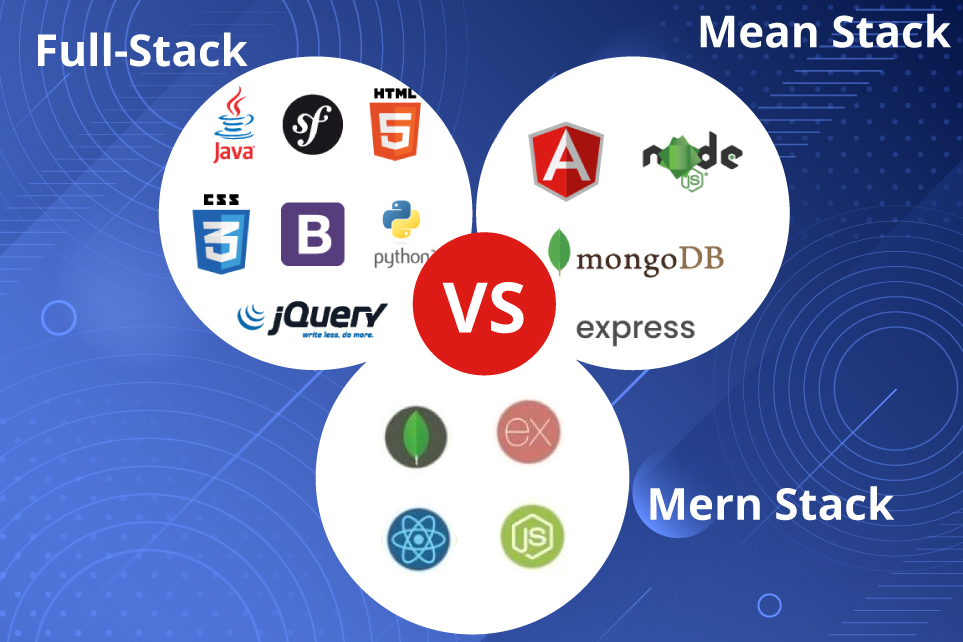Django vs Laravel vs MERN Stack vs MEAN Stack: Which is Better?
- Date

-
 admin
admin
Django vs Laravel vs MERN Stack vs MEAN Stack: Which is Better?
When choosing a framework or stack for web development, developers often find themselves comparing the most popular options. Among the top choices are Django, Laravel, MERN Stack, and MEAN Stack. Each of these technologies comes with its own set of strengths, weaknesses, and use cases. In this blog, we’ll dive into each of them, compare their features, and discuss when one might be a better choice than the others.
1. Django: The Python Powerhouse
Django is a high-level Python web framework that emphasizes rapid development and clean, pragmatic design. It follows the "batteries included" philosophy, meaning it comes with a lot of built-in features to help developers get started quickly.
Pros:
- Python-based: Python is known for its simplicity and readability, making Django a great choice for developers familiar with Python.
- Built-in Features: Django provides many built-in tools for common web development tasks like authentication, URL routing, and form handling.
- Security: Django has strong security features, including protection against common vulnerabilities like SQL injection, cross-site scripting (XSS), and cross-site request forgery (CSRF).
- Scalability: Although Django is well-suited for rapid development, it can also scale efficiently to handle larger applications.
Cons:
- Monolithic: Django is often seen as a monolithic framework, which means it might be less flexible than other frameworks in certain scenarios.
- Learning Curve: While Python is easy to learn, Django’s structure and "magic" can sometimes be overwhelming for beginners.
Best for: Projects that need a quick launch with a lot of built-in features (e.g., content management systems, social networks, or scientific applications).
2. Laravel: The PHP Framework
Laravel is a PHP framework that provides a clean and elegant syntax, making it easy to build robust applications. It comes with many pre-built tools like routing, authentication, and an ORM (Object-Relational Mapper) called Eloquent.
Pros:
- Elegant Syntax: Laravel is known for its clean, readable, and expressive syntax. It makes writing code simpler and more enjoyable.
- Eloquent ORM: Laravel's ORM simplifies database interactions and provides a more developer-friendly approach to working with relational databases.
- Community and Ecosystem: Laravel has a large community and many available packages, making it easy to extend its functionality.
- Blade Templating Engine: Laravel’s built-in Blade templating engine simplifies view rendering and makes it more efficient.
Cons:
- Performance: PHP is not as fast as some other languages like Node.js or Python, which can impact performance, especially for high-traffic applications.
- Heavyweight: Laravel’s built-in features can be overwhelming for small or simple applications, leading to unnecessary bloat.
Best for: PHP developers who want an elegant, feature-rich framework for building everything from simple websites to complex web applications.
3. MERN Stack: JavaScript End-to-End
The MERN Stack consists of MongoDB, Express.js, React, and Node.js. This stack allows developers to build full-stack applications using JavaScript for both the client and server sides.
Pros:
- Single Language (JavaScript): MERN uses JavaScript across the entire development stack, which simplifies development since both front-end and back-end developers can work with the same language.
- React: React is one of the most popular front-end libraries for building dynamic, interactive UIs. It allows developers to build fast, component-based UIs with minimal effort.
- Node.js: Node.js uses an event-driven, non-blocking I/O model, making it well-suited for building scalable, high-performance applications.
- MongoDB: MongoDB is a NoSQL database, which provides flexibility for handling unstructured or semi-structured data.
Cons:
- Complexity: Setting up a MERN stack can be more complex compared to monolithic frameworks like Django or Laravel, especially for beginners.
- SEO: Since React is client-side rendered, SEO can be a challenge, although solutions like server-side rendering (SSR) can help mitigate this.
Best for: Developers who are already familiar with JavaScript and want a full-stack solution for building real-time, interactive web applications.
4. MEAN Stack: Angular’s Take on Full-Stack Development
The MEAN Stack is very similar to MERN but uses Angular instead of React. The stack includes MongoDB, Express.js, Angular, and Node.js.
Pros:
- Single Language (JavaScript): Just like MERN, MEAN uses JavaScript for both the front-end and back-end, simplifying development.
- Angular: Angular is a comprehensive framework for building robust single-page applications (SPAs). It offers two-way data binding, dependency injection, and a modular structure, making it ideal for large-scale applications.
- MongoDB: MongoDB’s flexibility in handling NoSQL data makes it a good fit for MEAN’s dynamic data needs.
- Node.js: The use of Node.js ensures the back-end is highly performant, especially for applications that require real-time data.
Cons:
- Steeper Learning Curve: Angular can be more difficult to learn compared to React due to its complex syntax and design patterns.
- Less Flexibility: Angular is a full-fledged framework with many opinions about how things should be done, which might limit flexibility in some cases.
Best for: Developers who prefer Angular for front-end development and want to build large-scale, enterprise-level applications with a full-stack JavaScript solution.
Which One Should You Choose?
Each of these stacks and frameworks comes with its own strengths, and the "best" option depends on the requirements of your project and your team's expertise. Here’s a quick breakdown to help you decide:
- Choose Django if you are comfortable with Python and need a powerful, feature-packed framework to quickly develop web applications.
- Choose Laravel if you prefer PHP and want an elegant, expressive framework that can handle everything from small projects to large-scale applications.
- Choose MERN if you're a JavaScript developer who wants to use the same language across the entire stack and build modern, high-performance web applications.
- Choose MEAN if you like Angular and want a full-stack solution using JavaScript, with the added benefit of MongoDB and Node.js for real-time applications.
In conclusion, there is no one-size-fits-all solution. Each of these frameworks and stacks excels in different scenarios, so the right choice depends on your project needs, the language you're most comfortable with, and the scalability and flexibility required for your application.